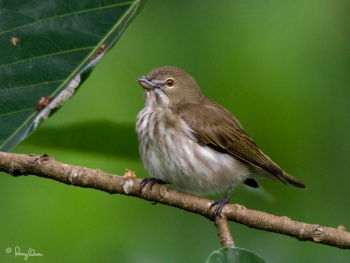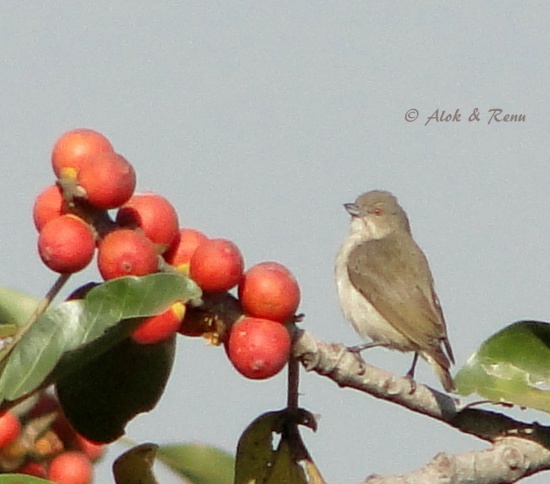(Picture of nominate subspecies. All sections now started. References Incomplete gone) |
|||
| Line 1: | Line 1: | ||
| − | + | [[Image:DSC02250.JPG|thumb|550px|right|Nominate subspecies<br />Photo by {{user|aloktewari|aloktewari}}<br />Karad City, Dist. Satara, Maharashtra, [[India]], December 2012]] | |
| − | [[Image: | ||
;[[:Category:Dicaeum|Dicaeum]] agile | ;[[:Category:Dicaeum|Dicaeum]] agile | ||
'''Inlcudes: Striped Flowerpecker''' | '''Inlcudes: Striped Flowerpecker''' | ||
==Identification== | ==Identification== | ||
| − | + | 9–10·4 cm | |
| + | *Olive-green upperparts | ||
| + | *Greyish white underparts, streaked on the breast | ||
| + | *Short tail | ||
| + | *Short thick curved bill | ||
| + | *Tubular tongue<br /> | ||
| + | The sexes are alike. | ||
==Distribution== | ==Distribution== | ||
| + | [[Image:Striped_Flowerpecker.jpg|thumb|350px|right|Luzon subspecies - ''striatissimum'', sometimes split as Striped Flowerpecker<br />Photo by {{user|Romy+Ocon|Romy Ocon}} <br />Mt. Makiling, Laguna Province, Luzon, [[Philippines]], January 2007]] | ||
Southern [[Asia]] from [[India]] east to [[Thailand]], [[Malaysia]], [[Singapore]] (where it is a rare non-breeding visitor) to [[Indonesia]] and [[Timor]]. | Southern [[Asia]] from [[India]] east to [[Thailand]], [[Malaysia]], [[Singapore]] (where it is a rare non-breeding visitor) to [[Indonesia]] and [[Timor]]. | ||
==Taxonomy== | ==Taxonomy== | ||
| − | + | ====Subspecies==== | |
| + | There are 11 subspecies<sup>[[#References|[1]]]</sup>: | ||
| + | *''D. a. agile'': North-eastern [[Pakistan]] and peninsula [[India]] | ||
| + | *''D. a. zeylonicum'': [[Sri Lanka]] | ||
| + | *''D. a. modestum'': Southern peninsula [[Thailand]], [[Malay Peninsula]] and [[Borneo]] | ||
| + | *''D. a. pallescens'': [[Bangladesh]] to [[Burma]], northern Thailand and north [[Vietnam]] | ||
| + | *''D. a. atjehense'': Northern [[Sumatra]] (Aceh, Utara and Selatan) | ||
| + | *''D. a. finschi'': Western [[Java]] | ||
| + | *''D. a. tinctum'': [[Lesser Sundas]] (Sumba, Flores and Alor) | ||
| + | *''D. a. obsoletum'': [[Timor]] (eastern Lesser Sundas) | ||
| + | *''D. a. striatissimum'': Northern [[Philippines]] (Lubang, Luzon, Romblon, Sibuyan, Catanduanes) | ||
| + | *''D. a. aeruginosum'': Central and southern Philippines (Cebu, Negros, Mindoro and Mindanao) | ||
| + | *''D. a. affine'': South-western Philippines (Palawan) | ||
| + | |||
| + | |||
| + | The last three subspecies from the Philippines are sometimes split as '''Striped Flowerpecker''', ''Dicaeum aeruginosum''. | ||
==Habitat== | ==Habitat== | ||
| − | + | A variety of woods and forests, both broadleaved evergreen. Found in the canopy and forest edges, gardens with fruit trees, particularly figs. | |
| − | |||
==Behaviour== | ==Behaviour== | ||
| − | + | They jerk their tails from side to side. | |
| − | + | ====Breeding==== | |
| − | + | They builds a purse-like nest suspended from a tree. The clutch consists of 2-4 eggs. | |
| − | + | ====Diet==== | |
| + | Their diet consists mostly of fruit, particularly figs and lantana. They also eat flowers, nectar and insects, including spiders. | ||
| + | ==References== | ||
| + | #{{Ref-Clements6thAug14}}#Handbook of the Birds of the World Alive (retrieved March 2015) | ||
| + | #BF Member observations | ||
| + | #AvianWeb | ||
| + | {{ref}} | ||
==External Links== | ==External Links== | ||
{{GSearch|Dicaeum+agile}} | {{GSearch|Dicaeum+agile}} | ||
Revision as of 16:02, 10 March 2015
- Dicaeum agile
Inlcudes: Striped Flowerpecker
Identification
9–10·4 cm
- Olive-green upperparts
- Greyish white underparts, streaked on the breast
- Short tail
- Short thick curved bill
- Tubular tongue
The sexes are alike.
Distribution

Photo by Romy Ocon
Mt. Makiling, Laguna Province, Luzon, Philippines, January 2007
Southern Asia from India east to Thailand, Malaysia, Singapore (where it is a rare non-breeding visitor) to Indonesia and Timor.
Taxonomy
Subspecies
There are 11 subspecies[1]:
- D. a. agile: North-eastern Pakistan and peninsula India
- D. a. zeylonicum: Sri Lanka
- D. a. modestum: Southern peninsula Thailand, Malay Peninsula and Borneo
- D. a. pallescens: Bangladesh to Burma, northern Thailand and north Vietnam
- D. a. atjehense: Northern Sumatra (Aceh, Utara and Selatan)
- D. a. finschi: Western Java
- D. a. tinctum: Lesser Sundas (Sumba, Flores and Alor)
- D. a. obsoletum: Timor (eastern Lesser Sundas)
- D. a. striatissimum: Northern Philippines (Lubang, Luzon, Romblon, Sibuyan, Catanduanes)
- D. a. aeruginosum: Central and southern Philippines (Cebu, Negros, Mindoro and Mindanao)
- D. a. affine: South-western Philippines (Palawan)
The last three subspecies from the Philippines are sometimes split as Striped Flowerpecker, Dicaeum aeruginosum.
Habitat
A variety of woods and forests, both broadleaved evergreen. Found in the canopy and forest edges, gardens with fruit trees, particularly figs.
Behaviour
They jerk their tails from side to side.
Breeding
They builds a purse-like nest suspended from a tree. The clutch consists of 2-4 eggs.
Diet
Their diet consists mostly of fruit, particularly figs and lantana. They also eat flowers, nectar and insects, including spiders.
References
- Clements, J. F., T. S. Schulenberg, M. J. Iliff, D. Roberson, T. A. Fredericks, B. L. Sullivan, and C. L. Wood. 2014. The eBird/Clements checklist of birds of the world: Version 6.9., with updates to August 2014. Downloaded from http://www.birds.cornell.edu/clementschecklist/download/
- Handbook of the Birds of the World Alive (retrieved March 2015)
- BF Member observations
- AvianWeb
Recommended Citation
- BirdForum Opus contributors. (2024) Thick-billed Flowerpecker. In: BirdForum, the forum for wild birds and birding. Retrieved 19 April 2024 from https://www.birdforum.net/opus/Thick-billed_Flowerpecker




